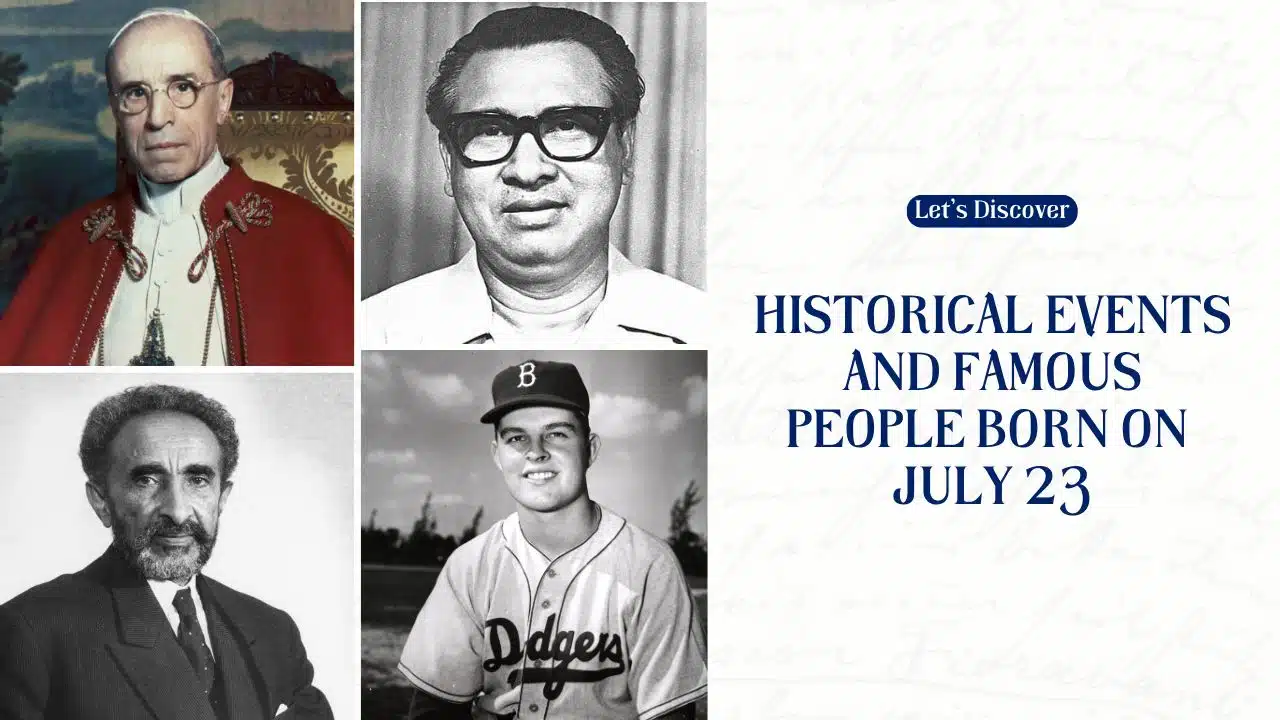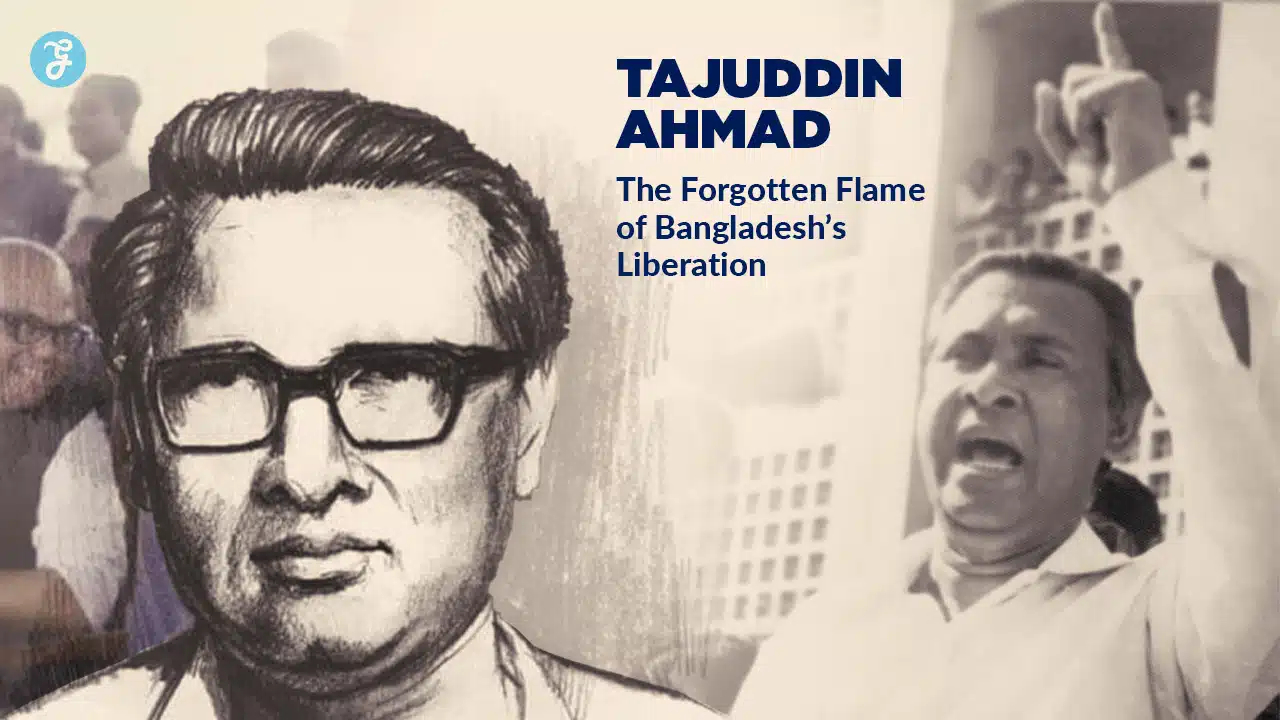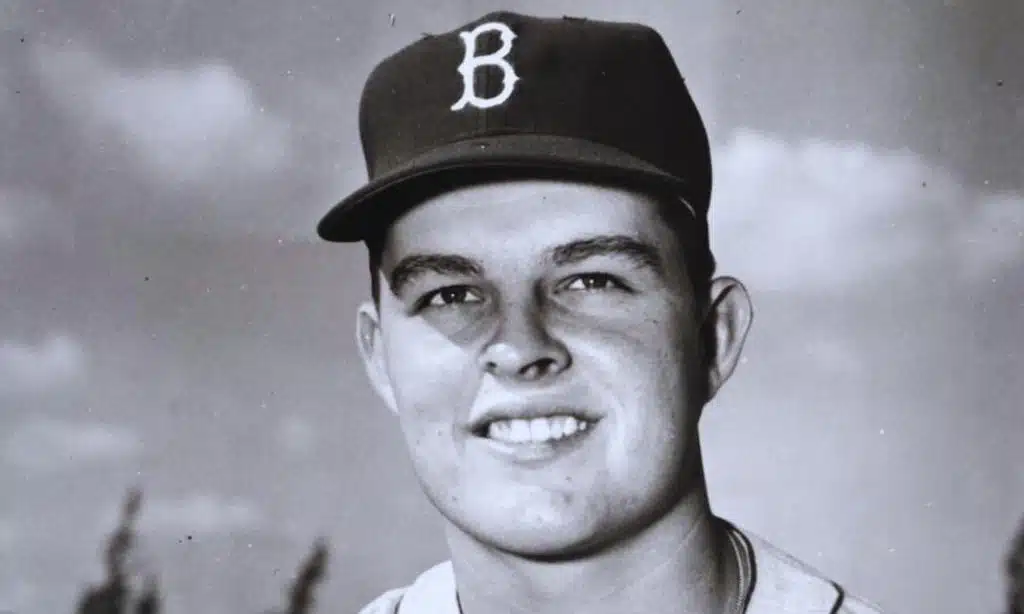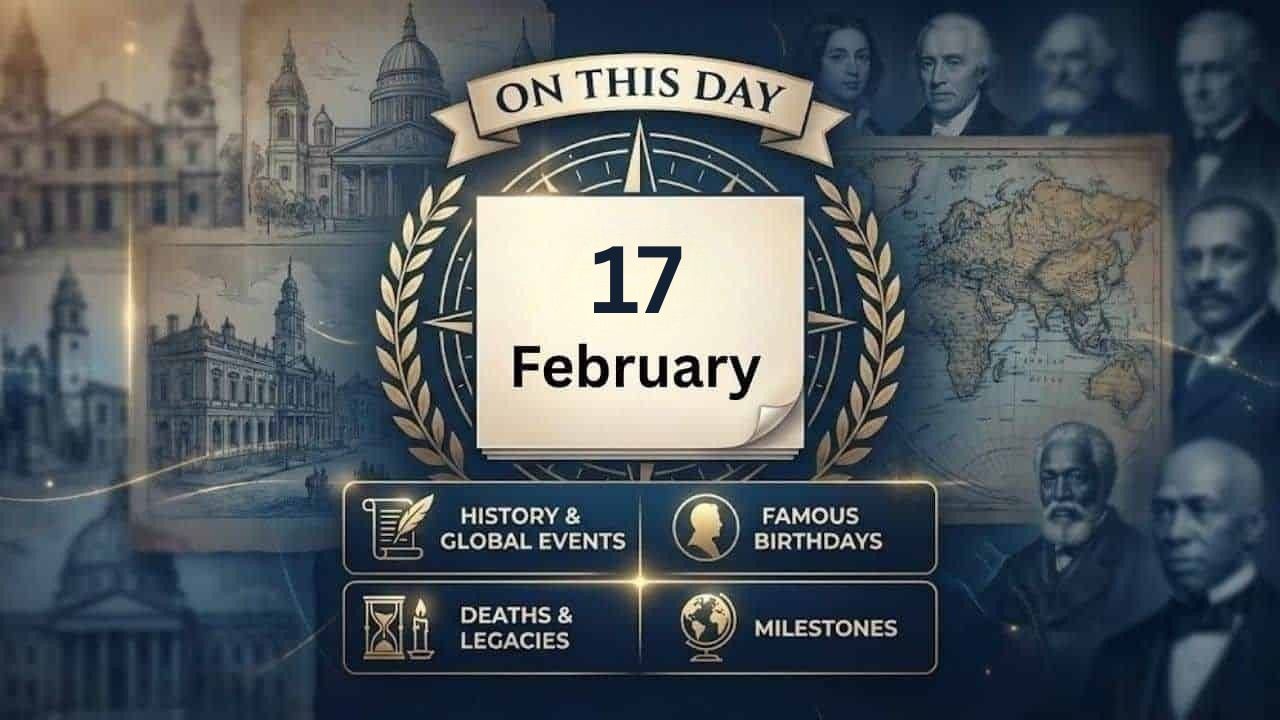July 23 is a day that has seen many important events throughout history. It’s also the birthday of several famous people who have made big impacts in different areas. In this article, we’ll look at some key events that happened on July 23 in the past, and learn about five well-known people born on this day. From decisions that changed the lives of many people to battles that shaped countries, and from actors to sports stars, July 23 has been an important date in many ways.
Historical Events on July 23
A. Pope Expels Jews (1253)
On July 23, 1253, Pope Innocent IV ordered all Jews to leave Vienne, France. This was a sad time when many people in Europe were unfair to Jewish people. Popes were very powerful back then, and their words could change many lives.
Pope Innocent IV was the head of the Catholic Church from 1243 to 1254. He made this decision during a time when many people wrongly blamed Jews for problems in society. This order forced Jewish families to leave their homes and businesses in Vienne.
This event was part of a bigger problem of anti-Jewish feelings in medieval Europe. It made life very hard for Jewish communities in France. Many families had to start new lives in other places where they hoped people would treat them better.
B. Battle at Gavere (1453)
On July 23, 1453, a big fight called the Battle at Gavere happened. Philip the Good, who was the Duke of Burgundy, won this battle against people from Ghent who were fighting against him.
The people of Ghent, a city in what is now Belgium, were unhappy with Philip’s rule. They wanted more freedom to make their own choices. This led to a rebellion against Philip’s power.
Philip won the battle, which was important for a few reasons:
- It showed Philip was strong and in control.
- It stopped the rebellion from Ghent.
- It changed how things worked in that area, giving Philip more power.
This battle was a big moment in the history of Flanders, which is now part of Belgium. It helped shape how that region was ruled for many years after.
C. Peace of Nuremberg (1532)
On July 23, 1532, two groups who had been fighting made peace. These groups were Emperor Charles V, who ruled a big part of Europe, and the Schmalkaldic League, which was a group of Protestant leaders.
This peace deal happened because there were big arguments about religion in the Holy Roman Empire, which was a large area covering much of central Europe. Some people wanted to change how the church worked (the Protestants), while others wanted to keep things the same (the Catholics).
The Peace of Nuremberg said that:
- The Protestants could keep practicing their religion for now.
- There would be no fighting over religion for a while.
- Both sides would try to work out their differences peacefully.
This peace deal was important because it stopped a war from happening right away. It gave both sides time to think and talk instead of fight.
D. Dutch Rebels Occupy Roermond (1572)
On July 23, 1572, troops led by William I of Orange took control of a town called Roermond. This was part of a big fight called the Dutch Revolt, where the Dutch were trying to become independent from Spain.
William I of Orange was a leader who wanted the Netherlands to be free from Spanish rule. Taking Roermond was important because:
- It showed the rebels were getting stronger.
- It gave them control of an important town.
- It was a problem for the Spanish, who were trying to keep control.
This event was part of the Eighty Years’ War, a long fight between the Dutch and the Spanish. It helped the Dutch in their path to becoming an independent country.
E. Franklin Returns to Philadelphia (1726)
On July 23, 1726, Benjamin Franklin came back to Philadelphia after a trip to England. Franklin was only 20 years old at this time, but he would later become one of America’s most famous leaders.
Franklin had gone to England to learn more about printing. He came back with new skills and ideas. This return to Philadelphia was important because:
- Franklin used what he learned to start his own printing business.
- He began to get involved in the city’s politics and community.
- It was the start of his long career as a writer, inventor, and leader in Philadelphia.
After coming back, Franklin did many things that helped shape early American history. He helped write the Declaration of Independence and became a famous scientist and diplomat.
Famous Birthdays on July 23
A. Tajuddin Ahmad (1925–1975)
Tajuddin Ahmad was born on July 23, 1925, in Kapasia, a subdistrict of Gazipur, in what was then British India and is now Bangladesh. He was one of the key political leaders in the history of Bangladesh and is especially remembered for his leadership during the country’s struggle for independence in 1971.
Here’s a short bio of Tajuddin Ahmad:
| Detail | Information |
|---|---|
| Born | July 23, 1925, in Kapasia, Gazipur, Bengal Presidency |
| Died | November 3, 1975 (aged 50) |
| Nationality | Bangladeshi |
| Role | First Prime Minister of Bangladesh |
| Known for | Leading the Provisional Government during the 1971 Liberation War |
| Political Party | Awami League |
Tajuddin Ahmad’s legacy in the history of Bangladesh is one of integrity, patriotism, and unwavering leadership during the nation’s darkest and most defining moments. As the first Prime Minister of Bangladesh, he provided critical direction and unity during the 1971 Liberation War when the country had no formal infrastructure or military of its own. His strategic thinking and diplomatic efforts helped gain international support for the cause of Bangladeshi independence.
Even though his life was tragically cut short, his influence remains deeply embedded in the fabric of the nation. He is widely respected for his honesty, humility, and selfless service—qualities rare in politics, then and now. Unlike many others, Tajuddin Ahmad avoided personal enrichment and focused solely on the well-being of the country.
B. Emil Jannings (1884-1950)
Emil Jannings was a famous actor born on July 23, 1884, in Switzerland. He grew up in Germany and became one of the biggest stars of early movies.
Here’s a short bio of Emil Jannings:
| Detail | Information |
|---|---|
| Born | July 23, 1884, in Rorschach, Switzerland |
| Died | January 2, 1950 (aged 65) |
| Nationality | German |
| Known for | Acting in silent films and early talkies |
| Notable works | “The Last Laugh,” “The Blue Angel,” “Faust” |
| Awards | First Academy Award for Best Actor (1929) |
Jannings was famous for playing strong, often tragic characters. He was the first person to win an Oscar for Best Actor. However, when movies with sound became popular, Jannings had trouble because of his strong German accent. He went back to Germany and made movies there, but his support of the Nazi government hurt his reputation after World War II.
C. Haile Selassie (1892-1975)
Haile Selassie was born on July 23, 1892. He became the Emperor of Ethiopia and was an important figure in African history.
Here’s a short bio of Haile Selassie:
| Detail | Information |
|---|---|
| Born | July 23, 1892, in Ejersa Goro, Ethiopia |
| Died | August 27, 1975 (aged 83) |
| Title | Emperor of Ethiopia (1930-1974) |
| Known for | Modernizing Ethiopia, resisting Italian invasion |
| International role | Helped form the Organization of African Unity |
| Religious significance | Revered figure in Rastafarian religion |
Selassie tried to make Ethiopia more modern during his long rule. He fought against Italy when they invaded Ethiopia in 1935. He became famous around the world for speaking at the League of Nations, asking for help against the invasion.
Selassie was also important in bringing African countries together. He helped start the Organization of African Unity, which later became the African Union. Some people, especially in the Rastafarian religion, saw him as a very special, almost holy figure.
D. Anthony Kennedy (b. 1936)
Anthony Kennedy was born on July 23, 1936. He became one of the most important judges in the United States.
Here’s a short bio of Anthony Kennedy:
| Detail | Information |
|---|---|
| Born | July 23, 1936, in Sacramento, California |
| Profession | Lawyer and Judge |
| Notable position | Justice of the U.S. Supreme Court (1988-2018) |
| Known for | Being a swing vote on many important cases |
| Education | Stanford University, Harvard Law School |
| Appointed by | President Ronald Reagan |
Kennedy started as a lawyer and teacher. President Reagan chose him to be on the Supreme Court in 1988. On the Court, Kennedy often had the deciding vote in close cases. He made important decisions on things like gay rights and abortion.
Kennedy was known for trying to find middle ground between different views. He retired from the Supreme Court in 2018 after serving for 30 years.
E. Don Drysdale (1936-1993)
Don Drysdale was born on July 23, 1936. He was one of the best baseball pitchers of his time.
Here’s a short bio of Don Drysdale:
| Detail | Information |
|---|---|
| Born | July 23, 1936, in Los Angeles, California |
| Died | July 3, 1993 (aged 56) |
| Position | Pitcher |
| Teams | Brooklyn/Los Angeles Dodgers (1956–1969) |
| Notable achievements | World Series champion (1959, 1963, 1965) |
| Honors | Baseball Hall of Fame (inducted in 1984) |
Drysdale was known for his sidearm pitching style and his toughness on the mound. He helped the Dodgers win three World Series titles. In 1968, he set a record by pitching 58⅔ innings without allowing a run.
After he stopped playing, Drysdale became a radio and TV announcer for baseball games. He was voted into the Baseball Hall of Fame in 1984, showing how important he was to the sport.
F. Graham Gooch (b. 1953)
Graham Gooch was born on July 23, 1953. He was one of England’s best cricket players and later became a coach.
Here’s a short bio of Graham Gooch:
| Detail | Information |
|---|---|
| Born | July 23, 1953, in Whipps Cross, London |
| Sport | Cricket |
| Position | Opening batsman |
| Teams | Essex, England |
| Career span | 1973–2000 |
| Notable achievement | Most runs scored for England in test matches |
Gooch was known for his strong batting and leadership. He played for England for 20 years and was the captain of the team for a while. He scored more runs for England in test matches than any other player when he retired.
One of Gooch’s best moments was when he scored 333 runs in a single innings against India in 1990. After he stopped playing, he helped coach new players and is still respected in the cricket world.
Connections and Reflections
Looking at these events and people, we can see how one day can connect to many parts of history. From decisions about religion long ago to modern sports and law, July 23 has been an important date.
The events show how leaders’ choices can affect many people, like when the Pope told Jews to leave Vienne or when William of Orange fought for Dutch independence. The famous people born on this day have also made big impacts, from entertaining people through movies and sports to making important decisions in government.
These stories remind us that history is made up of both big events and the lives of individual people. Each person and event on July 23 has added something unique to our world’s story.
Takeaways
July 23 has seen many important moments in history, from battles and peace treaties to the births of people who would change the world in different ways. We’ve learned about decisions that affected whole groups of people, like the expulsion of Jews from Vienne, and about individuals like Benjamin Franklin, whose return to Philadelphia was just the start of his amazing career.
We’ve also met five famous people born on this day who made their marks in movies, politics, law, baseball, and cricket. Each of these people, in their own way, has left a lasting impact on the world.
By looking at just one day in history, we can see how rich and varied our past is. It shows us that every day has the potential for important events and the birth of future leaders and stars.
References:
- Encyclopaedia Britannica. (2021). “Innocent IV.”
- Blockmans, W., & Prevenier, W. (1999). “The Promised Lands: The Low Countries Under Burgundian Rule, 1369-1530.”
- Brady, T. A. (2009). “German Histories in the Age of Reformations, 1400-1650.”
- Israel, J. I. (1995). “The Dutch Republic: Its Rise, Greatness, and Fall 1477-1806.”
- Franklin, B. (1771). “The Autobiography of Benjamin Franklin.”
- Eisner, L. H. (1986). “The Haunted Screen: Expressionism in the German Cinema and the Influence of Max Reinhardt.”
- Marcus, H. G. (1994). “A History of Ethiopia.”
- Toobin, J. (2007). “The Nine: Inside the Secret World of the Supreme Court.”
- Macht, N. L. (2013). “Don Drysdale: Hall of Fame Baseball Player.”
- Gooch, G. (1995). “Graham Gooch: My Autobiography.”








































